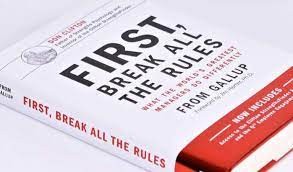How Do the Best Managers Find and Keep Talented Employees?

I finally read “First, Break All the Rules.” That book was on the bookshelf of one of my managers at Acordia in the late 1990s. I enjoy a good business book, so I don’t know what took me so long to read it.
The book was the product of two massive research studies conducted over 25 years. The first study concentrated on employees, asking, “What do the most talented employees need from their workplace?”.
The second was, “How do the world’s greatest managers find, focus, and keep talented employees?”
Here's what I got out of it.
In answer to the first question, measuring the strength of a workplace can be simplified to 12 items.
- I know what is expected of me at work.
- I have the materials and equipment I need to do my work right.
- At work, I have the opportunity to do what I do best every day.
- In the last 7 days, I have received recognition or praise for doing good work.
- My supervisor, or someone at work, seems to care about me as a person.
- There is someone at work who encourages my development.
- At work, my opinions seem to count.
- The mission or purpose of my company makes me feel my job is important.
- My fellow employees are committed to doing quality work.
- I have a best friend at work.
- In the last 6 months, someone at work has talked to me about my progress.
- This last year, I’ve had opportunities to learn and grow.
In answer to the second question (“How do the world’s greatest managers find, focus, and keep talented employees?”)
First-Select for talent. Pick the right people and trust them.
Second-Set expectations by defining the right outcomes.
Third- Focus on an employee's strengths. Motivate them by helping to develop those strengths.
Fourth-Find the right fit for them within the organization. Don’t overpromote. In other words, find a way to reward them for what they are good at and like to do. Don’t promote them to a level of incompetence (The Peter Principle) or a level they don’t enjoy.
People don’t change that much. Don’t waste time trying to put in what was left out. Try to draw out what was left in.
Some other gems:
- Just like your kids, employees are all different and should therefore not be treated the same. Even one of the greatest basketball coaches, Phil Jackson, didn’t manage Dennis Rodman the way he managed Michael Jordan.
- It’s okay to be personal. How can you manage people if you don’t know their style, motivation, and personal situation?
- Don’t disparage the orders coming down from the top to your employees. It makes your job easier but weakens the organization.
- Make few promises, but keep them all.
- As a manager, you are always on stage and giving off clues to your employees.
That’s my book report. Of course, these lessons sink in better if you read the book, but if you don’t have time, that’s the gist of it.


